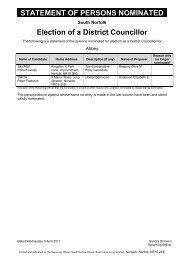Download the Transnational Ecological Network - South Norfolk ...
Download the Transnational Ecological Network - South Norfolk ...
Download the Transnational Ecological Network - South Norfolk ...
Create successful ePaper yourself
Turn your PDF publications into a flip-book with our unique Google optimized e-Paper software.
VISION FOR WETLANDSTOWARDS BIODIVERSITY-RICH FLOODPLAINSTHE WAVENEY AND LITTLE OUSEThe long established wetland habitats of Britainand Western Europe were home to a greatrichness of native species of plants andanimals.These continued to exist side by side with<strong>the</strong> needs of local people, who used <strong>the</strong>se areas aspart of <strong>the</strong>ir local economy over long periods of timeas grazing land, or to produce thatching materialsand o<strong>the</strong>r useful products. However, wetland areas inmuch of Britain and Western Europe have seen greatchanges in <strong>the</strong> past century. Many rivers and streamshave been straightened, deepened and o<strong>the</strong>rwiserealigned. Water quality has declined. Extraction ofwater from boreholes and improved land drainageand flood protection have led to <strong>the</strong> drying out ofparts of <strong>the</strong> floodplains. Much of <strong>the</strong> land beside <strong>the</strong>rivers, in <strong>the</strong>ir flood plains, has been drained andploughed instead of <strong>the</strong> fens, reedbeds and marshgrassland that had existed for centuries previously.Whilst <strong>the</strong>se changes were brought about to satisfy<strong>the</strong> perceived need to change land uses, reduceflooding and o<strong>the</strong>rwise ‘improve’ agriculturalproduction, <strong>the</strong> concomitant decline of <strong>the</strong> wildlifevalue and hydrological functioning of <strong>the</strong>se formerwetland habitats, and of <strong>the</strong> species <strong>the</strong>y harboured,has been severe.Assorted ducksThere is now a great wish on <strong>the</strong> part of public andvoluntary organisations with responsibilities forwildlife, landscape and <strong>the</strong> environment to seek towork in partnership with local people and <strong>the</strong> ownersof wetlands, and former wetlands, to regain some of<strong>the</strong> benefits for biodiversity that <strong>the</strong>se areas used tooffer in abundance. Biodiversity is considered as <strong>the</strong>variety of life in all its forms. As one contribution tothis effort, partners in <strong>the</strong> Ne<strong>the</strong>rlands, Germany,Denmark and <strong>the</strong> UK (Suffolk and <strong>Norfolk</strong> CountyCouncils) have formed a partnership to promoteinitiatives in <strong>the</strong>ir areas which will provide benefits forwetland habitats through a project called <strong>the</strong><strong>Transnational</strong> <strong>Ecological</strong> <strong>Network</strong> (TEN). Theseinitiatives are to be seen as demonstrations for o<strong>the</strong>rsimilar initiatives elsewhere in <strong>the</strong> partner countriesand beyond.1


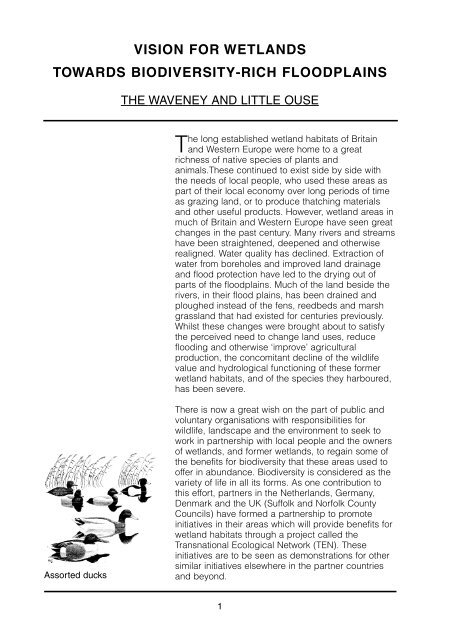
![List of outstanding appeals against planning decisions [PDF, 30 Kb]](https://img.yumpu.com/51294693/1/190x135/list-of-outstanding-appeals-against-planning-decisions-pdf-30-kb.jpg?quality=85)

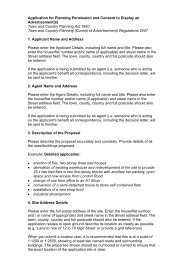
![Brown bin calendar - week 2 [PDF] - South Norfolk Council](https://img.yumpu.com/49352110/1/184x260/brown-bin-calendar-week-2-pdf-south-norfolk-council.jpg?quality=85)
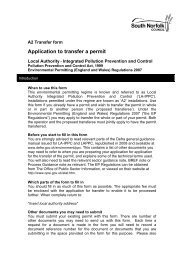

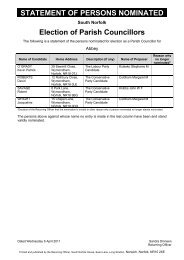
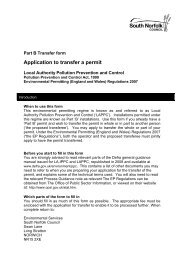
![Link magazine, Spring 2008 [PDF, 4,450k] - South Norfolk Council](https://img.yumpu.com/43994858/1/184x260/link-magazine-spring-2008-pdf-4450k-south-norfolk-council.jpg?quality=85)
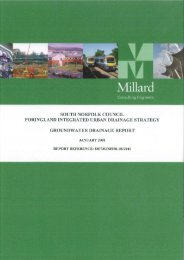
![South Norfolk Council Volunteering Opportunities [PDF]](https://img.yumpu.com/42079564/1/184x260/south-norfolk-council-volunteering-opportunities-pdf.jpg?quality=85)
![Tiffey Valley Guide [PDF, 1,450k] - South Norfolk Council](https://img.yumpu.com/41615145/1/124x260/tiffey-valley-guide-pdf-1450k-south-norfolk-council.jpg?quality=85)
![Queen's Diamond Jubilee Fund [PDF] - South Norfolk Council](https://img.yumpu.com/41088331/1/184x260/queens-diamond-jubilee-fund-pdf-south-norfolk-council.jpg?quality=85)
